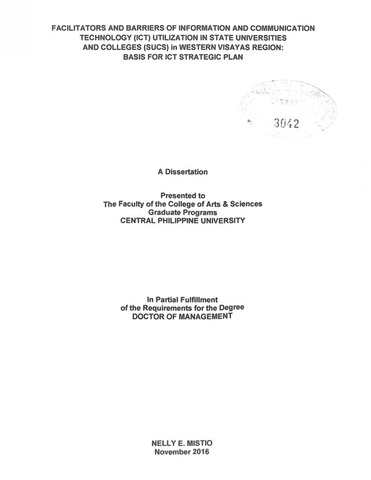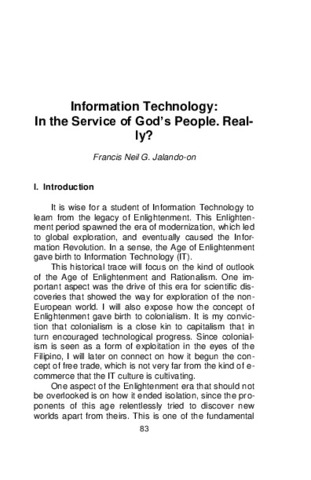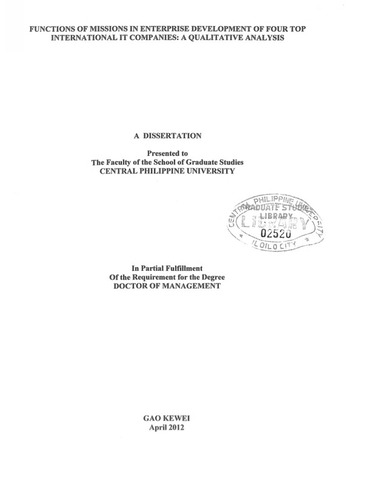Facilitators and barriers of information and communication technology (ICT) utilization in State universities and colleges (SUCs) in Western Visayas region: Basis for ICT strategic plan

Page views
1,025Date
2016Auteur
Thesis Adviser
Defense Panel Chair
Share
Metadata
Afficher la notice complète
Résumé
This is a descriptive-relational study which utilized one-shot survey design using a researcher-made questionnaire. This study covered administrators, faculty and staff members of the main campuses of eight (8) State Universities and Colleges in Western Visayas region who were occupying permanent positions. The study samples consisting of 598 were drawn using stratified random sampling, proportionate to size. Three sets of questionnaires were administered to the respondents according to their designation.
This study aimed to assess the extent of ICT utilization in State Universities and Colleges (SUCs); specifically, to determine the respondents’ personal characteristics; their adequacy of ICT training, ICT competence and frequency of ICT access; their perceived adequacy of ICT infrastructure, availability of ICT human resource, adequacy of ICT financing and availability of ICT planning and monitoring; their perceived usefulness of, perceived ease of use of and attitude towards ICT; their intention to use ICT, and their extent of ICT utilization and the correlation of each variable.
The findings of the study revealed that the dominant users of ICT were female and above 40 years of age, married and master’s degree holders. More of them were working in a university and in Level II to III accredited SUCs. The majority of the respondents had adequate ICT training, high ICT competence, and had frequently accessed the ICT hardware, peripherals, and Internet. The ICT infrastructure among SUCs was perceived by the respondents as inadequate. There were ICT personnel responsible for planning, implementation, and monitoring of ICT projects/initiatives but limited in number. ICT financing was also perceived as adequate and ICT plans were available, implemented, and monitored. Moreover, the majority of the respondents perceived ICT as easy to use and useful in their work. They had a favorable attitude towards ICT and a strong intention to use it. Finally, the administrators, faculty members, and staff had been utilizing ICT to a great extent.
Significant relationships were found, at 5 percent level, between the type of school, SUC accreditation level, ICT training, ICT competence, frequency of ICT access, availability of ICT plan, and perceived ease of use of ICT; between SUC accreditation level, type of school, ICT competence, frequency of ICT access, ICT training, availability of ICT plan and perceived usefulness of ICT; between the type of school, SUC accreditation level, ICT training, ICT infrastructure, availability of ICT plan, perceived usefulness of ICT and attitude towards ICT. Moreover, significant relationships were also found between the civil status, frequency of ICT access, ICT financing, availability of ICT plan, perceived ease of use of ICT, and intention to use ICT; between educational attainment, ICT training, availability of ICT plan, attitude towards ICT, ICT competence and extent of ICT utilization. The other tests of relationships between variables were found to be not significant.
The identified facilitators of ICT utilization in this study were ICT competence and favorable attitudes towards ICT while the barriers were ICT training and availability of ICT plan.
Description
Abstract only
Suggested Citation
Mistio, N. E. (2016). Facilitators and barriers to information and communication technology (ICT) utilization in state universities and colleges (SUCs) in Western Visayas region: Basis for ICT strategic plan. (Unpublished Doctoral Dissertation). Central Philippine University, Jaro, Iloilo City.
Type
DissertationSujet
Department
School of Graduate StudiesDegree
Doctor of Management major in Public ManagementShelf Location
GSL Theses 658.0072 M691
Physical Description
xviii, 218 leaves
Collections
Related items
Showing items related by title, author, creator and subject.
-
Information technology: In the service of God’s people. Really?
Jalando-on, Francis Neil G. (Institute of Advanced Theological Studies (IATS) and College of Theology, 2005)It is wise for a student of Information Technology to learn from the legacy of Enlightenment. This Enlightenment period spawned the era of modernization, which led to global exploration, and eventually caused the Information ... -
Functions of missions in enterprise development of four top international IT companies: A qualitative analysis
Kewei, Gao (2012)Humans are born with life. Once a person is born, he can live. As long as he is provided with the basic survival conditions, he will have the ability of self-sustaining, and he can live on. The enterprise is not a life ... -
The catalytic role, realities, challenges, and effectiveness of digital technologies in higher vocational colleges
Huang, Jialin (Central Philippine University, 2025-05)This study survey-correlational study aimed to determine the catalytic role, realities, challenges, and effectiveness of digital technology in higher vocational colleges. The participants of the study were selected full-time ...




